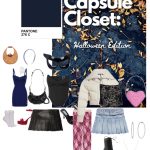By Tyler Martin
Have you ever thought, “I’ll buy five tops for the price of one because that’s more bang for my buck?” Or that you can’t re-wear an outfit once you’ve posted it on Instagram? Sustainability can be a challenging subject to comprehend, especially for us college students who live a fast-paced lifestyle, constantly seeking the quickest possible way to get our hands on the newest trend. New items flood our social media pages daily, but what is truth behind the mass production of these products? I wanted to take a moment to discuss why this topic is so important and why we should be more mindful about where we get our clothes from.
At times I find it difficult to make consistent, conscious decisions, even though I have read and tried to educate myself on the importance of sustainability. Yes, I re-wear certain clothing items often in my closet, but still find myself in the habit of wanting to buy new items for special events or trips. It’s a habit I’m trying to break, but it can be hard to completely avoid.
This summer, when packing for my six-week trip to France, I had no choice, thanks to the bag weight limit, but to edit my wardrobe and pack responsibly. I grabbed all my go-to basics: my button-downs, pleated pants and a few pairs of comfortable sneakers. I was sad that I couldn’t pack a million printed and colored items to wear for every unique night out in France. Although, at the time, I was not thinking about sustainability, as I solely made good packing decisions based on my travel circumstances.
This same summer, while taking a Fashion Media course abroad taught by Professor Jenny Davis, I watched a documentary that truly opened my eyes to the importance of sustainability. The documentary was titled Sweatshops: Deadly Fashion and follows a young, Cambodian woman living in poverty who works for a massive, fast-fashion company as a seamstress. Three students from the U.K. followed her around at home and at work to discover the harsh reality of workers who produce clothing in third-world countries. To say this documentary was eye-opening would be an understatement. The woman worked tirelessly from sunrise to sunset, sitting in the same uncomfortable chair with little breaks or moments of relief. Not only is her job draining, but also paid her an unlivable wage, causing her to remain in poverty. It was after watching this documentary that I was inspired to try harder to implement sustainability into my life.
It might seem overwhelming for just one student to tackle such a massive obstacle. Yet, as with many societal issues, you have to start somewhere. Here are a few ideas of ways we can actively be more conscious without completely uprooting our shopping habits in 2023:
Rewear your items:
It can be annoying and feel repetitive, but it is important to rewear your clothing items in order to give them a proper life. Clothing is not meant to be worn once or twice. You should wear your clothing as many times as possible.
Invest in high-quality basics:
Instead of going on Amazon and ordering a handful of cheap going-out tops, try investing in one great basic piece you can style in a million ways. A versatile top can be worn repeatedly and styled in a variety of ways with your go-to miniskirt, jeans or vegan leather pants. You’ll feel better about your environmental impact and enjoy wearing clothes of higher quality.
Look into second-hand and vintage:
Being sustainable is all about giving life to your items and continuing to rewear them. Instead of buying that shiny, new designer bag, consider looking into a vintage piece from an online reseller, like The RealReal, that will make you stand out and is most likely a fraction of the price. It is a thoughtful choice that will aid you in the style department.
There are countless ways to be more thoughtful about our shopping habits that don’t include taking all of our Zara and Forever 21 items and throwing them into a fireplace. Although, it is crucial to know the impact your spending choices have based on where you choose to shop. There are several online resources available to educate and inspire you to shop sustainably, and once your point of view changes, you will have a completely different outlook.
Cover artwork by Staff Member Athena Mamatas







